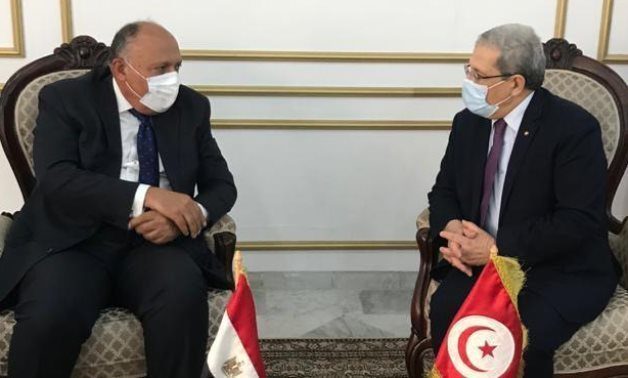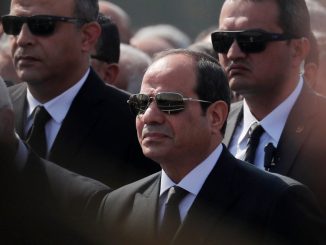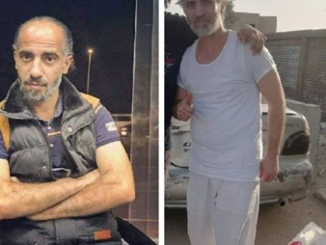
On 19 April, Egyptian Foreign Minister Sameh Shoukry headed to Kenya to kick off an African tour, including six African countries, that is South Africa, Senegal, DR Congo, Tunisia and the Comoros. during which, he briefed leaders of African countries on recent updates on the Grand Ethiopian Renaissance Dam (GERD) file.
In a statement, the foreign ministry’s spokesman, Ahmed Hafez, said that Shoukry’s tour includes Comoros, South African, Senegal, and Tunisia. the Egyptian top diplomat also visited the Democratic Republic of Congo, the current chair of the African Union.
During these visits, Shoukry carried messages from Egypt’s Abdel-Fattah al-Sisi to the leaders of these countries on GERD updates and the Egyptian stance in this regard.
Ethiopia plans to move ahead with the second filling of the dam in July despite the objections of Egypt and Sudan over the move in the absence of a legally binding deal.
Rounds of African Union-sponsored negotiations to reach an agreement have failed, including the latest round in the Congolese capital of Kinshasa earlier in April. The talks, held under the auspices of the AU, were dubbed by Egypt as the “last chance.”
“This tour stems from Egyptian keenness to brief countries of the African continent on the reality of the situation of the negotiations in terms of the Renaissance Dam issue,” Hafez said.
The tour also came as Egypt is keen “to back the path of reaching a legally binding agreement on the filling and operation of the dam in a way that takes into consideration the interests of the three countries,” Hafez noted.
The statement added that this Egyptian endeavor seeks to reach an agreement “before the start of the second filling process [of the GERD] and before any unilateral measure is taken”.
Hafez said the tour also seeks to “reiterate the Egyptian stance calling for launching a serious and effective negotiation process that leads to reaching the desired agreement.”
Besides the African Union, Egypt and Sudan have called for involving extra-regional mediators — the United States, the United Nations, and the European Union — in the GERD talks. Ethiopia has, to date, rejected this step.
Egypt and Sudan earlier in April sent letters to the UN Security Council calling for international engagement in the talks to help the Egyptian-Sudanese endeavor to reach a binding deal on the GERD.
Shoukry in Tunisia, last stop in African tour
Shoukry’s seven-legged tour was meant to explain to African leaders the latest developments in the GERD dispute following the collapse of Kinshasa negotiations
Egyptian Minister of Foreign Affairs Sameh Shoukry delivered a message on Thursday from Egypt’s Abdel-Fattah al-Sisi to his Tunisian counterpart Kais Saied to explain Egypt’s stance on the recent developments in the stalled negotiations over the disputed Grand Ethiopian Renaissance Dam (GERD), the Egyptian foreign ministry said.
Shoukry also discussed on Thursday the latest developments in the GERD dispute in Tunis with his Tunisian counterpart Othman Jerand.
Jerandi received Shoukry upon his arrival in Tunisia.
During a visit to Cairo last week, Saeid affirmed that his country will never accept Egypt’s water security be compromised, stressing that Tunisia adopts the same stances as Egypt in the international arena.
Tunisia is the seventh and last stop for Shoukry in his African tour following Kenya, Comoros, South Africa, the Democratic Republic of Congo, Niger, and Senegal.
Kenya and Tunisia are currently the only two African countries that have non-permanent membership in the UN Security Council (UNSC).
The decade-long dispute, which has been a source of tension between Cairo and Khartoum, on one side, and Addis Ababa, on the other, has recently escalated on the heels of the collapse of the Kinshasa talks earlier this month.
Egypt and Sudan have repeatedly pursued reaching a legally binding agreement on the rules for filling and operating the GERD amid concerns that the hydropower dam will affect their water shares, but the step has been repeatedly dodged or rejected by Ethiopia.
Downstream countries Egypt and Sudan sent letters to the UNSC explaining the latest developments in the GERD crisis and asking for a resolution that prohibits Ethiopia from taking any unilateral action, including its intention to embark on a second filling of the dam’s reservoir in July before a legally binding instrument is reached.
Ethiopia, on the other hand, has called upon members of the UNSC to urge Egypt and Sudan to return to the African Union-brokered tripartite negotiations.
The Facebook page of the Egyptian Ministry of Foreign Affairs published a post saying, “In the last leg of his African tour: Minister Shoukry hands over a message from Al-Sisi to the President of the sisterly Republic of Tunisia.
On the last leg of his current tour in a number of African countries, Minister of Foreign Affairs Sameh Shoukry met on April 22, 2021 with President of the sisterly Republic of Tunisia, Kais Saied. Shoukry expressed at the beginning of the meeting appreciation for His Excellency’s recent visit to Egypt, which witnessed excellent consultations in a manner that would contribute to further promoting the historical relations between the two countries towards broader horizons.
Ministry of Foreign Affairs Spokesperson, Ambassador Ahmed Hafez, stated that, during the meeting, Minister Shoukry delivered the message addressed by President Abdel Fattah Al-Sisi to his brother, President Saeid. The message tackled the latest developments of the Renaissance Dam file and Egypt’s position in this regard, out of Egypt’s keenness to coordinate with sisterly Tunisia in light of the close ties binding the two countries and Tunisia’s non-permanent seat in the Security Council. In this context, Minister Shoukry expressed appreciation for the statements made by President Saied during his recent visit to Egypt stipulating that Tunisia will not accept any prejudice to Egypt’s water security, and that the Egyptian position on water issues is identical to the Tunisian position.
Hafez added that the Minister of Foreign Affairs was also keen to brief the Tunisian president in detail on deliberations that took place in the Kinshasa meetings held on April 4 and 5 regarding the Renaissance Dam, highlighting Egypt’s position during these meetings and the sincere will it showed, hoping that they would steer a serious negotiation path leading to a binding legal agreement on the GERD filling and operation, in a manner that preserves the rights of the three countries, achieves their common interests, and fosters regional security and peace.
The meeting also addressed the distinguished bilateral relations between Egypt and Tunisia, as the Foreign Minister expressed Egypt’s aspiration to continue boosting bilateral cooperation with Tunisia in various fields.”



